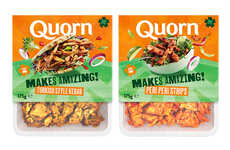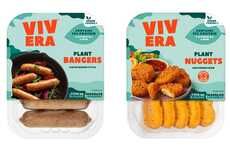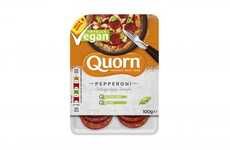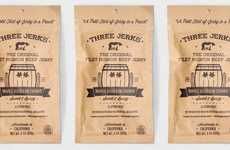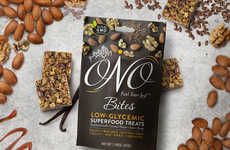
Quorn Foods Meat Alternatives Have Hit the US Market with New Options
Michael Hemsworth — September 22, 2017 — Lifestyle
References: foodbev
The Quorn Foods Meat Alternatives brand has just released a new line of refrigerated meat-free options in the US market that will satisfy the expanding need for vegetarian foods. Set to launch in 1,500 Kroger grocery stores across the US, the new meat alternatives includes Italian Sausage, Chicken Strips and Chicken and Apple Sausage. This offers consumers a way to up the protein and taste level of their favorite foods without having to resort to meat options.
The Quorn Foods Meat Alternatives are positioned as a sustainable protein option that also targets consumers who are looking for food products that have a lesser impact on the planet. The products are made with non-GMO ingredients and have a carbon footprint that's 70% or lower than traditional meat products.
The Quorn Foods Meat Alternatives are positioned as a sustainable protein option that also targets consumers who are looking for food products that have a lesser impact on the planet. The products are made with non-GMO ingredients and have a carbon footprint that's 70% or lower than traditional meat products.
Trend Themes
1. Meat-free Alternatives - The increasing demand for vegetarian options creates a market opportunity for businesses to develop and offer healthy, sustainable meat-free alternatives.
2. Sustainable Food Products - Businesses can differentiate themselves by creating and promoting food products with a reduced environmental footprint.
3. Non-gmo Ingredients - The growing interest in non-GMO products creates a market opportunity for businesses to promote and develop products made with non-GMO ingredients.
Industry Implications
1. Food Retail - Food retailers can capitalize on the increasing demand for meat-free options by stocking and promoting a variety of meat-free alternatives.
2. Food Manufacturing - Food manufacturers can meet the demand for sustainable, non-GMO ingredients by sourcing and incorporating these ingredients into their products.
3. Agriculture - Agriculture businesses can develop sustainable farming practices to meet the need for non-GMO ingredients for food products.
1.2
Score
Popularity
Activity
Freshness




